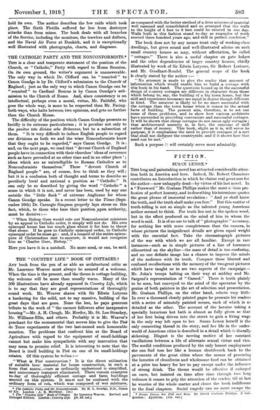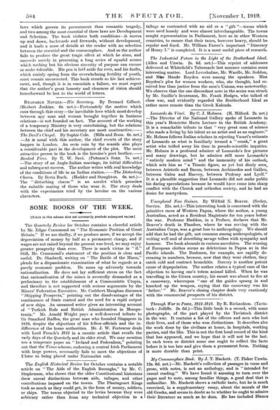FICTION.
SUSAN LENOX.* Tars long and painstaking novel has attracted considerable attention both in America and here. Indeed, Mr. Robert Chambers contributes an Introduction in which he claims real greatness for the author—now unhappily dead—by virtue of his last novel. In
a "Foreword" Mr. Graham Phillips makes the most serious profession of perfect honesty, and in describing his intentions quotes the great phrase of immortal revelation : " And ye shall know the truth, and the truth shall make you free." But this matter of truth-telling is not so simple as the talented young American author seemed to think. For truth lies not in the spoken word, but in the effect produced on the mind of him to whom the word is said. It is of no use to talk of " photographic " accuracy, for nothing lies with more completeness than the camera, in whose pictures the insignificant details are given equal weight with the essential fact. Take the cinematograph pictures of the war with which we are all familiar. Except in rare instances—such as in simple pictures of a line of horsemen silhouetted on the skyline—the mass of detail is too confusing, and no one definite image has a chance to impress the minds of the audience with its truth. Compare these blurred and confused recollections with the memory of the two great pictures which have taught us to see two aspects of the campaign— Mr. ,John's troops halting on their way at midday and Mr. Sargent's representation of " Gassed." There is truth plainly to be seen, but conveyed to the mind of the spectator by the genius of both painters in the art of selection and presentation. Mr. Graham Phillips, on the other hand, selects very little. In over a thousand closely printed pages he presents his readers with a series of minutely painted scenes, each of which is as detailed as the other. The account of the heroine taking a specially luxurious hot bath is almost as fully given as that of her first being driven into the street to gain a living wage in the only way left open to her. Susan Lenox herself is the only connecting thread in the story, and her life in the underworld of American cities is described in a detail which is literally sickening. Disgust is the moving motive of her constant vacillations between a life of alternate sexual virtue and vice. The sordid conditions produced by the only honest employment she can find toss her like a human shuttlecock back to the pavements of the great cities where the means of procuring the luxuries of cleanliness and wholesome food can be obtained at a price too heavy for her to pay except under the influence of strong drink. The theme would be effective if enlarged on once, but insisted on time after time through two long volumes it ceases to grip the attention of the reader, till at last he wearies of the whole matter and closes the book indifferent to the final chapters. Social tragedy can no more escape the
laws which govern its presentment than romantic tragedy, and two among the most essential of these laws are Development and Selection. The book violates both conditions—it moves up and down, backwards and forwards, without development, and it hurls a mass of details at the reader with no selection between the essential and the commonplace. And so the author fails to produce the great tragic effect at which he aims, and succeeds merely in presenting a long series of squalid scenes which nothing but his obvious sincerity of purpose can excuse or make tolerable. His pen is laid aside for ever, and his faults, which mainly spring from the overwhelming fertility of youth, must remain uncorrected. This book stands as his last achievement, and, though it is in essentials a failure, we must regret that the author's great honesty and clearness of vision should henceforward be lost to the world of letters.
READABLE NOVELS.—Ilis Secretary. By Bernard Gilbert. (Herbert Jenkins. lis. net.)—Fortunately the motive which runs through this story—the inevitable love which must develop between any man and woman brought together in business relations—is not founded on fact. The account of the working of a temporary Ministry is very entertaining, but the relations between the chief and his secretary are most unattractive.
The Devil's Chapel. By Sophie Cole. (Mills and Boon. 6s. net.) —As is usual with this author, the chief events of the story happen in London. An eerie ruin by the seaside also plays a considerable part in the development of the plot. The most attractive person in the book is the heroine's poet brother. Banked Fires. By E. W. Savi. (Putnam's Sons. 7s. net.) —The story of an Anglo-Indian marriage, its initial difficulties and subsequent success. The author writes with real knowledge of the conditions of life in an Indian station.—The Disturbing Charm. By Berta Ruck. (Hodder and Stoughton. 6s. net.)— The " disturbing charm " is an amulet which promises the suitable mating of those who wear it. The story deals with the experiments tried by the heroine on the various characters.







































 Previous page
Previous page